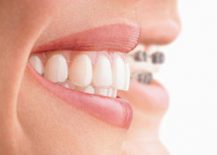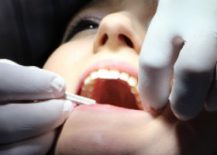Restorative dentistry is usually about repairing what is already there but when it comes to dental implants in East Molesey, we can replace a tooth that has been lost many years or even decades ago!
Oral implants are very well established and have come a long way in the last ten years, when they moved from the realms of oral surgery in established hospitals into clinics across the country.
Our dental implants in East Molesey have improved the quality of life of our patients and brought our restorative dentistry to a whole new level, with them feeling like real teeth and requiring a daily treatment regimen that is similar to real teeth.
Oral implants are a form of immobilized prosthetic; they consist of an artificial tooth mounted with a connector to a titanium rod. The titanium rod is below the gum line and is fused into the jawbone behaving like your natural root and supporting the prosthetic tooth above it.
What’s it like to have oral implants?
Oral implants are carried out in two stages. In the first one, the implant is placed below the gum line interacting with the jaw; the titanium implant is then held in place and the gum is sealed over it.
This allows new bone to grow between the jaw and the implant, firmly anchoring it in place. The gum tissue supports the implant and stops it from being dislodged during talking and eating. You should expect some sensitivity of the gum immediately after this procedure but it’s impact is minimal. We will probably provide you with a prophylactic course of antibiotics and a recommendation to use over-the-counter painkillers when required.
The second part of the procedure only occurs once the implant is secure. The gum is opened and the prosthetic tooth is locked onto the connector at the top of the implant. This procedure is known as loading and is very minimal as the top of the implant is very close to the gum line.
Who is suitable for oral implants?
Our dental implants in East Molesey are suitable for most patients. There are few conditions that would make them entirely out of the question. These are mostly revolved around blood clotting disorders that would complicate performing a surgical procedure at a dental clinic.
All procedures that involve osseointegration, the laying down of living bone interacting with titanium, are dependent on the rate of bone growth and affected by bone density. Some of these things are lifestyle based. Habits such as smoking or uncontrolled diabetes will mean it may take significantly longer for the implant to set and it may not set at all.
There are a range of prescription medications that reduce bone growth, like all chemotherapy and radiotherapy. It is not that these conditions or prescriptions make it impossible to carry out the fitting of oral implants, only that it reduces the chances of success.
If you would like to speak to a member of our dental team about your personal situation and how it may affect oral implant treatments feel free to get in contact with the clinic. If you leave a message and a contact number they will get back to you as soon as possible!














